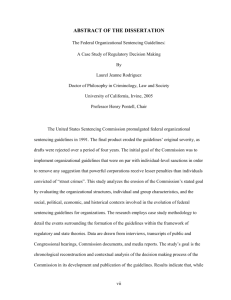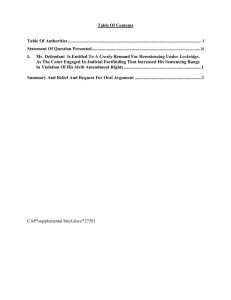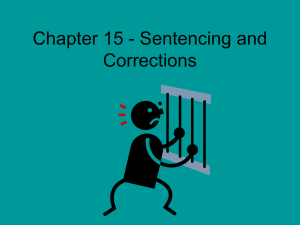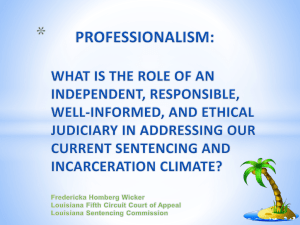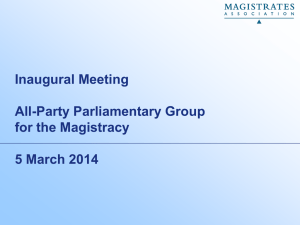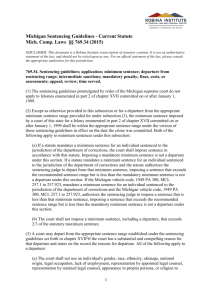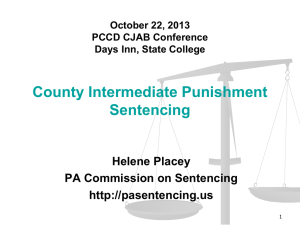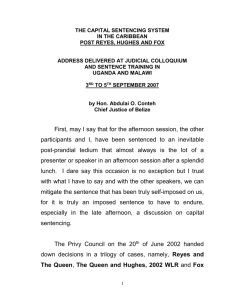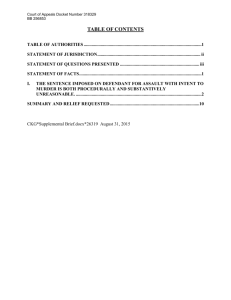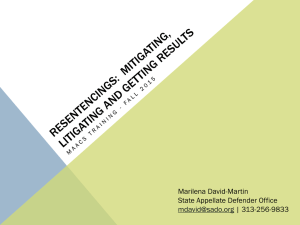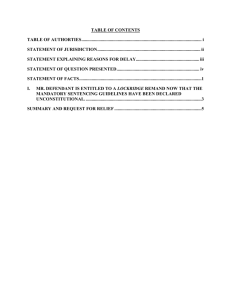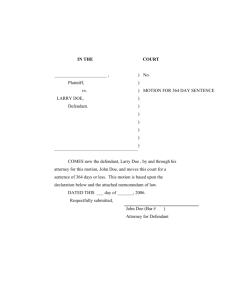Sample Brief 5 - Michigan State Appellate Defender Office
advertisement
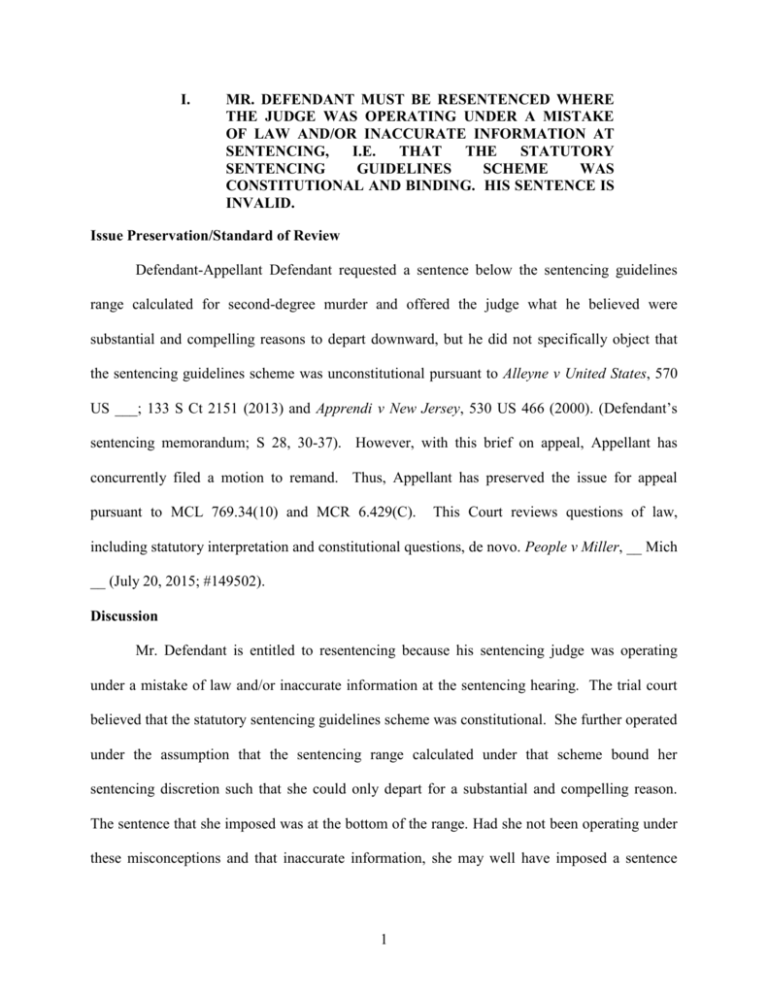
I. MR. DEFENDANT MUST BE RESENTENCED WHERE THE JUDGE WAS OPERATING UNDER A MISTAKE OF LAW AND/OR INACCURATE INFORMATION AT SENTENCING, I.E. THAT THE STATUTORY SENTENCING GUIDELINES SCHEME WAS CONSTITUTIONAL AND BINDING. HIS SENTENCE IS INVALID. Issue Preservation/Standard of Review Defendant-Appellant Defendant requested a sentence below the sentencing guidelines range calculated for second-degree murder and offered the judge what he believed were substantial and compelling reasons to depart downward, but he did not specifically object that the sentencing guidelines scheme was unconstitutional pursuant to Alleyne v United States, 570 US ___; 133 S Ct 2151 (2013) and Apprendi v New Jersey, 530 US 466 (2000). (Defendant’s sentencing memorandum; S 28, 30-37). However, with this brief on appeal, Appellant has concurrently filed a motion to remand. Thus, Appellant has preserved the issue for appeal pursuant to MCL 769.34(10) and MCR 6.429(C). This Court reviews questions of law, including statutory interpretation and constitutional questions, de novo. People v Miller, __ Mich __ (July 20, 2015; #149502). Discussion Mr. Defendant is entitled to resentencing because his sentencing judge was operating under a mistake of law and/or inaccurate information at the sentencing hearing. The trial court believed that the statutory sentencing guidelines scheme was constitutional. She further operated under the assumption that the sentencing range calculated under that scheme bound her sentencing discretion such that she could only depart for a substantial and compelling reason. The sentence that she imposed was at the bottom of the range. Had she not been operating under these misconceptions and that inaccurate information, she may well have imposed a sentence 1 below the guidelines range, as the defendant asked her. (Defendant’s sentencing memorandum; S 28, 30-37). Mr. Defendant is entitled to resentencing. In imposing sentence, the judge noted the tragedy for everyone involved, but stated that she could not go below the sentencing guidelines range. (S 38-39). In context, pre-Lockridge, that comment must be taken to mean that she did not believe that the reasons offered by the defense constituted substantial and compelling reasons as defined by law such that she was allowed to depart from the binding range. The court stated: This is one of the saddest cases I have ever had. A young woman’s life is gone. And an otherwise law abiding citizen’s life is ruined…. I do not believe that you are a cold blooded murder. Or that this case has anything to do with race. Or that you are some sort of monster. I do believe that you acted out of some fear, but mainly anger and panic. And an unjustified fear is never an excuse for taking someone’s life…. So what do we have. One life gone and one life ruined. I am confident that if you weren’t going to prison today you would never commit another crime, for the rest of your life. I am also certain that you are remorseful and that you regret your actions immeasurably. However, none of that excuses what happened in this case. And I’m certain that you’ve thought about the family over and over again…. Regardless of whether or not she sought [sic] help. She needed help. And when she needed help she ended up meeting her death. I fully recognize that you did not bring these circumstances to your door step. They arrived there. But once they did, you made choices that brought us here today. I would call it the worst mistake of your life. But I don’t know that you can ever us the word mistake to describe a murder. And a person was murdered. I cannot go below the guidelines. In this case your attorney wanted four to seven. The Prosecutors Office through the People of the State of Michigan through Kim Worthy’s Office have asked for a guideline sentence. And I think that that’s reasonable. [S 38-39 (Emphasis added).] Very recently, the Michigan Supreme Court held that our statutory sentencing guidelines scheme was unconstitutional pursuant to Allyene, supra and Apprendi, supra and that the error was plain. People v Lockridge, ___ Mich ___ (July 29, 2015; #149073). The Supreme Court explained: “a straightforward application of the language and holding in Alleyne leads to the 2 conclusion that Michigan’s sentencing guidelines scheme violates the Sixth Amendment.” Lockridge, supra, slip op, p 16. As a result, the Lockridge Court severed MCL 769.34(2) to the extent that it is mandatory and struck down the requirement of a “substantial and compelling reason” to depart from the guidelines range in MCL 769.34(3). Lockridge, supra, slip op, 29, 40. The Court also held that to the extent that any part of MCL 769.34 or another statute refers to use of the sentencing guidelines as mandatory or refers to departures from the guidelines, that part or statute is also severed or struck down as necessary. Id., slip op, pg 2, n 1. Our Supreme Court has long held that a sentence is invalid when it is based on constitutionally impermissible grounds, is based on a misconception of law, or is based on inaccurate information. People v Miles, 454 Mich 90, 96 (1997).1 See also MCL 769.34(10). That is the situation here. Mr. Defendant’s sentence is invalid and he is entitled to resentencing. 1 Citing People v Triplett, 407 Mich 510, 515 (1980); People v Whalen, 412 Mich 166, 170 (1981); and People v Eason, 435 Mich 228, 233 (1990). 3 SUMMARY AND REQUESTS FOR RELIEF AND ORAL ARUGMENT WHEREFORE, for the foregoing reasons, DEFENDANT respectfully asks that this Honorable Court reverse and remand for new trial (Issues I & II) or if he fails in that request then to vacate the manslaughter conviction/sentence and remand for resentencing on second-degree murder (Issue III) or remand for resentencing pursuant to Issue IV. He also requests oral argument in this matter. Respectfully submitted, STATE APPELLATE DEFENDER OFFICE /s/ Jacqueline J. McCann BY:________________________________________ JACQUELINE J. MCCANN (P58774) Assistant Defender 3300 Penobscot Building 645 Griswold Detroit, Michigan 48226 (313) 256-9833 Dated: August 18, 2015 4
